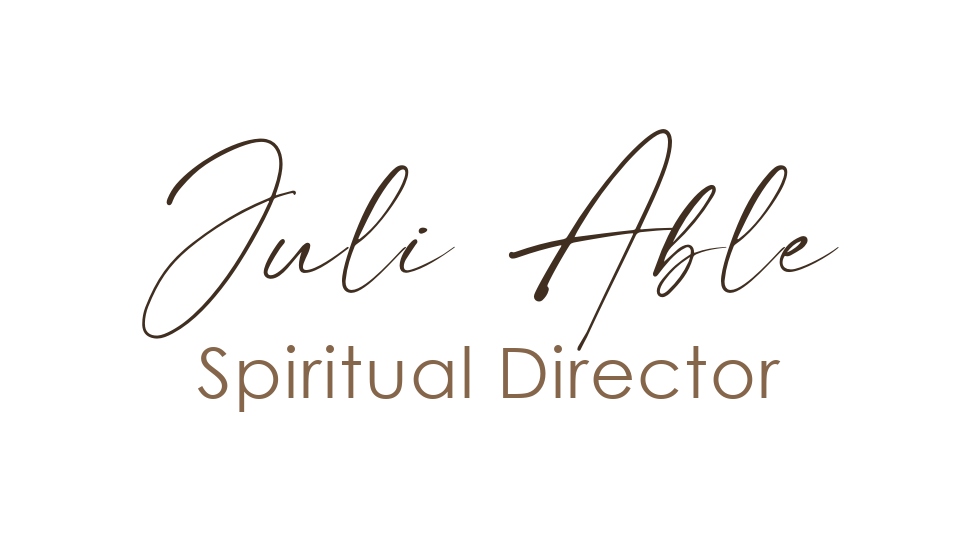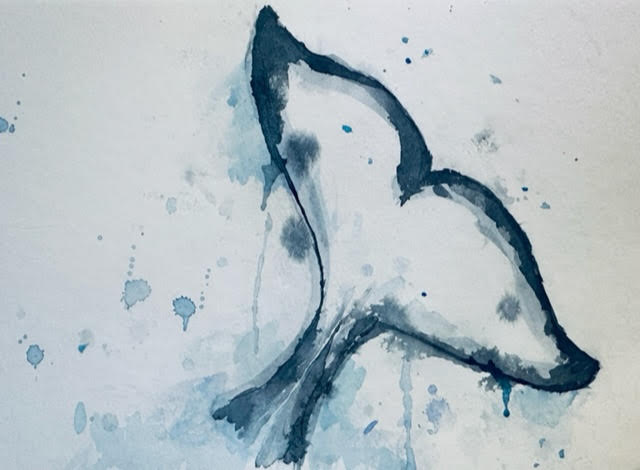We live within a “context of gifts”. Sometimes that’s apparent to me. Other times, I lose sight. When life is busy, loud, common, or crowded, my connection with God and the reflection of God in the world can feel spotty at best. So, I take my cue from a long line of others, including Jesus, who step away momentarily – seeking stillness, silence, and solitude – to tend my soul that needs connection with God. I need to regularly experience, not just intellectually agree, that this is a God-bathed, God-permeated world. A felt connection with God informs, forms, and feeds me.
In a world notorious for busy, loud or just stringently routine, it’s helpful to share experiences of this God-bathed, God-permeated world we live in together. And so, I’d like to lend you my recent encounter, and allow it room to inform, perhaps form, and feed us.

In August, I boarded a small ship in Alaska for a circuitous journey through the Inside Passage, where we would meander – adjust our path and pace to whatever we encountered on the way. Meandering allows for interruptions, and the first arrived on Day One around 4:30pm. A sighting of killer whales from the bridge engulfed me in a crowd, a mass of excited people making our way above deck to see for ourselves.
Emerging on the bow, my first awareness was of others around me, already ohh-ing and ahh-ing. I tried to match my gaze to theirs. And I saw … water. Lots of water. I squinted, trying hard to make out more. Imagining … perhaps, that was that was a fin, not a ripple of water? And honestly, getting frustrated. I wanted to see what they were seeing before it slipped away forever in the frigid North Pacific waters. Feeling this scarcity, I grumbled to myself about my stinking’ eyesight and spotty focus. The lady next to me tried to help, but her attempts just didn’t help. I took a couple deep breaths, realizing my own trying wasn’t helping either.
Our ship turned toward the whales, and eventually I saw them. Well, I saw slips of them. A fin. A tail. A splash. A spout of water. Here, and gone in an instant. For thirty minutes our ship followed them. More emerged. Certainly, a pod, maybe two. With at least one baby.
A naturalist on board shared her observations and answered questions. I learned that when the fluke (or tail) came out of the water it signified a deep dive of seven to eight minutes before they would break the surface again.
I attempted, like everyone else, to time this so I could capture a fabulous surface-breaking moment on my phone’s camera. Mostly I ended up with slanted images of water and more frustration. I lacked the equipment and reflexes for this kind of photography. Another deep breath, and I tucked the phone away, deciding to simply be present, to take in the experience.
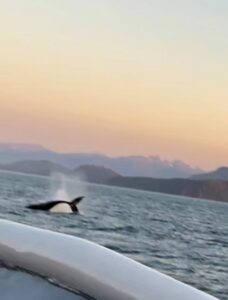
Eventually we needed to leave the whales, and it was dinner time. We headed below deck. Yet all through dinner, exclamations of whale sightings out the windows continued. The whales, it seemed, were now swimming with us. Because they stuck around, our evening agenda shifted to more whale watching. Returning to the bow, we found an estimated three pods of killer whales all around the front of the ship. Some were close, others further out.
The sun sank in the sky as the whales moved with us. After some time, our naturalist guide suggested the possibility of letting our questions rest, our words rest, our cameras rest. That we might simply take in our present moment surroundings, this context of gifts, in silence together. The sun setting, the sky coloring, the whales swimming all around us. It. Was. Magical.
As those moments lingered, what impressed me most was not the sight of these sleek black bodies, but the sound of their breathing. Because we were silent together, I could hear. Even the breath of the furthest whale was clear, pronounced, and powerful. Focused listening to the release of deeply held breath by massive, mysterious creatures, again and again and again. Witnessing this in the shared silence of fifty awe-struck observers. Lingering in unbroken quiet for, I don’t know, maybe twenty minutes. I lost track. I lost track of everything but the graceful arcs of swimming whales, their powerful exhales, and the silence that held it. Silence that allowed me to not only witness but enter the rhythmic experience of apex predators disappearing into dark depths then breaking the surface with exhales shooting water in the air like big city fountains.
It was such a captivating exhale that my body started exhaling alongside of them. Until the sun slipped lower and the whales disappeared. And I was left with this peace. And lighter somehow for their exhales that released things in me.
Only afterwards I realized how loaded-down I had entered that ship. Here I had been so proud of myself for traveling to Alaska with only a carry-on. I had sweated real sweat to make that happen (and almost broke some zippers.) Yet I lumbered up that gangplank, with anxieties and over-responsibilities and expectations galore. Me and my little stretched-to-the-max carry-on weighed 10,000 pounds. And those breathing orcas invited my body to exhale. It marked the beginning of my letting go.
It didn’t happen all at once, but it started there – in my body, not in my head. My body held the wisdom. My body led the way.
There is a tradition within the Christian faith, a way of being with and understanding God, some call the Incarnational Stream. “It concerns itself with the relationship between spirit and matter, that God is manifest to us through material means.”[i] It encourages us to face outward, into the world, and discover places of connection with God, reflections of God, invitations from God. The gift of this tradition is its invitation to discover and experience God present and active in ordinary, everyday life, whether that’s at sea in Alaska or at home in hot Atlanta.
So, returning to that God-bathed, God-permeated moment, I look for clues, invitations, and wisdom that might help me in the present, and in this busy, sometimes loud, divisive, anxious season upon the earth.
- First I remember: there is permission to meander, to adjust my path and pace to how I am and what I need. Life with God is not often to be found on the most efficient, quickest, or one-size-fits-all route. In the invitation to meander I find freedom, to pursue what helps me move toward God. I don’t need to do it all, listen to it all, find meaning in it all. What am I drawn to? What brings peace on the inside? What satisfies and replenishes me? What helps me rest? God doesn’t should us. God feeds us. And God feeds all of us – not just our minds, but also our hearts and our bodies. What does my body need today? How might I get in touch and listen to the voices in my head? The cares of my heart? What helps me meander into heart spaces – with myself and with others?
Meandering is slow, and so is this soul work. It takes the time it takes. And there is enough time, regardless of what the outside world tells us. Soul work is intentionally slow. So, expect slow. Trust that a gradual process is taking shape from the inside out and just keep showing up for it. A daily life that meanders is on the lookout for things worth savoring. This is the heartbeat of a contemplative life with God – slowing down to enjoy an experience, connecting everyday sparks of goodness to the warm, loving embrace of God’s love. This is God loving me through God’s creation. And it doesn’t just happen. I must intentionally pause to receive the goodness God is offering. I choose to cultivate it, let it take up space within me, and nourish my soul.
- I also see from my experience that my first instinct was to look at others. They were a distraction to me – what they were seeing, doing, experiencing. I compared myself to them, measured myself against them, wanted what they had – their intense experience and amazing photos. All that’s normal. And, not so helpful. Others are a part of this context of gifts. But they aren’t the focus. I’m invited into their stories and they, mine. But that comes and goes as I stay present to myself and God. So as best I can, I seek to appreciate and learn from other’s experiences, but not get hooked by what they are doing or discovering. I can notice when it does pull me off-track, because I am human, and it will. And let it go.
- I also found myself trying and striving, feeling like time was running out. I experienced frustration with my limitations: my stinking eyesight and spotty focus. Annie Dillard speaks to the importance of seeing the world around us unimpeded by our inner distractions: “I can’t go out and try to see this way (meaning, try hard to see God’s presence and invitations in my life). I’ll fail, I’ll go mad. All I can do is try to gag the commentator (in my head), to hush the noise of the useless interior babble that keeps me from seeing”.[ii] She adds, “Although it comes to those who wait for it, it is always, even to the most practiced and adept, a gift and a total surprise.” Finding God in my life always comes as grace. I seek this; I ask for it; I have a role to play in it that I cooperate with, but I cannot make it happen. This was why silence was crucial to my seeing and hearing, breathing and letting go. Trying hard is normal, automatic, even. In silence I initially become more aware of the noise in my head. This is the gift of awareness that silence brings. When I notice the noise of trying, I’m learning to breathe, open my hands, and let it go.
- And this: tuck the phone away. For a few hours, every day. Really, really. Give it a try. Experiment. I’m convinced it’s the loudest silent thing on this planet. And it clamors for me. I’m learning to entrust all of life to God in the silence of disconnection from the world at my fingertips.
- Turn toward the whales … or the deer, or the birdsong, or the breeze moving in trees or the slanted sunlight shining through them. Let silence open the door to noticing. Then linger with what you notice. Just observe it for a while. No trying hard. The pause is the work. Invisible things happen when I pause. Trust that. This is a God-bathed, God-permeated world. I don’t have to concoct something. God is already here. I just need to cultivate a practice of noticing and pausing. Turn towards the sparks, big and small. This can begin with simply taking in my present moment surroundings. Leave room every day to set your agenda aside and be.
- It’s a paradox that in silence we learn to listen – to ourselves, to God, and to others. And silence isn’t always easy – externally or internally. How can you lean toward silence? Welcome it? Return to it? Weave it through your days? Ask for silence and the capacity to listen openly as a grace, as a gift from God. I recently read a poem describing all sorts of ways we listen: https://ahundredfallingveils.com/2024/10/06/ways-to-listen-an-incomplete-list/ What kind of listening do you want to grow?
- Let’s appreciate the release of deeply held breath. The power of an exhale. See it as an invitation to release frustration, anxiety, over-responsibility, expectations. Where are you holding your breath? What added weights do you carry into bed at night? Or awaken to in the morning? As best you can, put some words to them. And then exhale, literally. As a prayer. As a way of releasing them, entrusting them to God. Take a deep, belly breath in. Hold it. Let your cheeks puff out with the held breath. Then let it out, through your mouth. I feel that exhale in my shoulders. Where do you feel it?
The body holds wisdom and can lead the way. Gently check in with your body. What does it need right now? a walk? a nap? a glass of water? more exhaling prayers? fresh air? to knock out some avoided to-do’s? You know, we can pray with our bodies, not just our words. What shape might that take with you today? Your showing up is prayer. Your silence is prayer. What is your body saying to you? To God? Pause to notice, to listen, and consider what a step into your body’s invitations could look like.
- And lastly, we are always presently encompassed in a context of gifts. Go discover them, not by trying but by pausing. Let them come to you in silence, stillness or solitude. Let them inform, form, and feed you. Practice savoring them – Taste and see. Eat and enjoy. Richard Foster encourages us, “You are meant to experience God as truly manifest and notoriously active in your daily life.”[iii] Jesuit Priest, Joseph Tetlow affirms how very much we need these intimate experiences. He says, “A God who created our souls once at our conception seems a God long gone; we need contact with an ongoing Maker.”[iv]
May we learn to live in the flow of God’s goodness, in this context of God’s gifts.
Amen.
[i] Dallas Willard, The Divine Conspiracy, ch 3
[ii] David Fleming, Draw Me Into Your Friendship, The Spiritual Exercises, p.27
[iii] Richard Foster, Streams of Living Water, p.260
[iv] Annie Dillard, Devotional Classics, p.346
[v] Richard Foster, Streams, p.272
[vi] Joseph Tetlow, SJ. The Fundamentum, Creation in the Principle and Foundation, p.3
For Reflection
Taking pictures is one of my favorite ways of remembering, but it falls short of savoring all a moment holds. Some pictures hold more promise than others. My only whale pic from our trip doesn’t do it for me.
But these other photos contain more … Engage all of your senses with the images – see, touch, taste, smell, listen. What emotions, connections, questions, desires do they stir in you? Share these with God. Then be silent and listen for how God may respond – now or later.
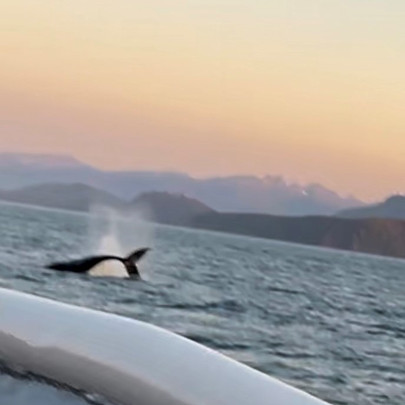
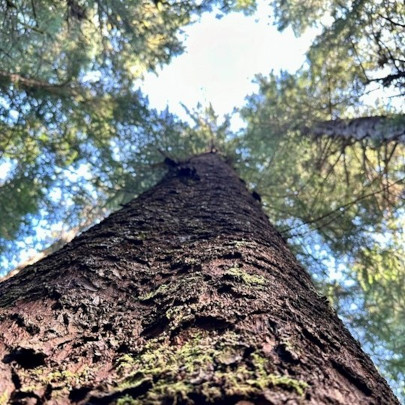
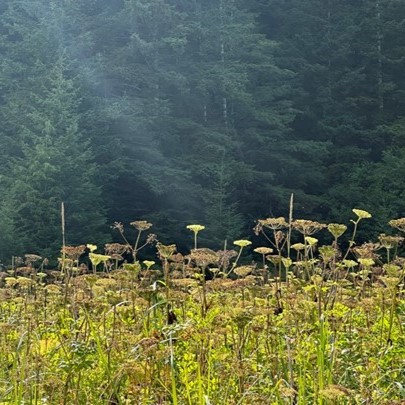
- What recent experience could be a good place for you to practice savoring? Take some time to pause, remember, re-enter with your senses, feel and simply enjoy. Ask God for the grace to savor this as a gift of love. Maybe begin with a photo and let it expand into a space of prayer.
- Meandering, comparing, striving, scarcity, technology, turning toward, silence, breathing. These were my noticings. Review the bullet points above. Which ones open up for you? Where do you feel frustration? God’s invitations can be found in both places. What might be God’s invitation to you today?
- What is informing, forming, feeding you these days? How can you make a little more room each day to let God’s gifts be part of what nourishes you?
Greatly troubled in his mind,
he went to a place in the woods
where not a leaf was moving
and under the trees the creek
was flowing without a sound,
a place as low in this world
as the water had worn, and the quiet
came down from highest morning,
as he knew, only to be broken,
but the while it lasted would stay
with him and comfort him
in whiles that would come after.
Wendell Berry, Another Day
